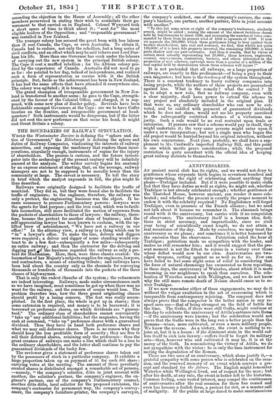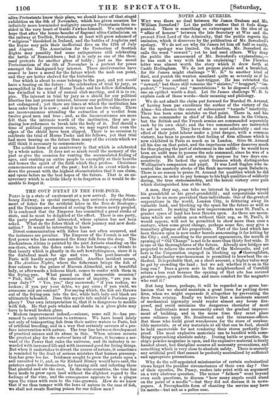ANNIVERSARIES.
AN ancient naval club has its rights, and we would not deny to gentlemen whose corporate birth begins in seventeen hundred and sixty-something, the right of celebrating almost anything they please—Trafalgar included. But if it were possible to make clubs feel that they have duties as well as rights, we might ask, whether Trafalgar is not already celebrated enough ; whether gentlemen at the Thatched House, however ancient, can render it more cele- brated; and whether the present is exactly the proper moment to endow it with the celebrity required ? No Englishmen will forget Trafalgar, even in presence of the French alliance ; but we need not talk about it because we remember it. The almanack brings round with it the anniversary, but carries with it no compulsion of observance. The anniversary itself is a human idea, ficti- tious in strict accuracy, and impracticable, since no civil year being of scientifically exact length, we do not attain a real recurrence of the day. Made by ourselves, we may treat the anniversary as we please ; and sometimes it is better honoured by the omission than the observance. Patriotism ruled the hour at Trafalgar; patriotism made us sympathize with the leader, and makes us still remember him; and it would suggest that the pre- sent moment is not the fittest to rejoice in a victory over those whose defeat would now be our own. Anniversaries are two- edged weapons, cutting against us as well as for us. Few can have failed to feel some slight sense of relief in considering that the force of natural chronology has exonerated us from repeating, in these days, the anniversary of Waterloo, about which it is more becoming in our neighbours to speak than ourselves. The cele- bration of Waterloo ceased with Wellington, and we do not know why the still more remote death of Nelson should cause us to re- vive Trafalgar. If we now remember either of these engagements, we may do it without the vulgar exultation in the act of overcoming which is inseparable from contemporary rejoicing. The conquest does not always prove that the conqueror is the better nation in any re- spect save one—that of being strongest on the field of battle for the time. The Goths, if there were still Goths, might continue at this day to celebrate the anniversary of Attila's entrance into Roma —if the anniversary were known ; but the celebration would not prove that the Goths were in the long run a better people than the Romans—wiser, more cultivated, or even a more military people. We know the reverse. As a victory, the event is nothing to re- joice at, but it is a lesson : if pie dominant state in the world suf- fers itself to sink into luxury—suffers itself to forget its military arts—then, however wise and cultivated it may be, it is at the mercy of the Goth. In remembering the victory of Attila, we do not sympathize with the victor : he is only the base instrument for meting the degradation of the Roman. There are two uses of an anniversary, which alone justify it,—a grateful sympathy with some person who is celebrated on to occa- sion, and the renewed memory of an event which conveys a pre- cept and standard for the future. The English might remember Waterloo while Wellington lived, out of respect for the man ; but after his death, at any rate, the event is better left to the historian. Common feeling, some vested interest, may compel the continuance of anniversaries after the real occasion for them has ceased and even has become a foolish form, a pretext for riot, or a muster-call of malignity. If the public at large dared to make sanctimonious
nitra-Protestants know their place, we should leave off that stupid exhibition on the 5th of November, which has given occasion for infinitely more lowminded malignity amongst Protestants than re- sided in the very heart of Guido Fawkes himself. We entertain a hope that after the bonne-bouche of flagrant ultra-Catholicism on the railway at Trellick, Protestants at least will grow ashamed of " reli 'one " bloodshed in Ireland, and the battles of Aughrim aad the Boyne may pale their ineffectual fires on the 12th of July and August. The Association for the Protection of Scottish Rights may possibly find some antiquarians still celebrating the battle of Bannockburn; but it is only as one of the thou- sand pretexts for another glass of toddy ; just as the moral Protestantism of the 5th of November is a pretext for pence amongst the blackguard-boy interest. These anniversaries have ceased to have a moral for the future which the mob can point, and they are better shelved for the historian.
One which is about to cease belongs to the past, and yet would have a bearing on the future : the celebration of trial by jury, as exemplified in the case of Horne Tooke and his fellow defendants, las dwindled to a kind of annual club meeting, and it is to ex- pire. The interest in trial by jury as a shield for our political liberties has lost present interest, because our political liberties are not endangered ; yet there are times at which the institution has been safer than it is now ; and it never can lose its value. There are inconveniences attending the extraction of a verdict from twelve good men and true ; and, as the inconveniences are more felt than the intrinsic worth of the institution, they are in- ducing law-reformers to break into the body of it. But should a time of political oppression recur, we may regret that even the edges of the shield have been clipped. There is no occasion to celebrate the trial of Horne Tooke and his fellows, yet that trial had more bearing on the future than many of the events which we still think it necessary to commemorate.
The noblest form of an anniversary is that which is celebrated by a whole nation. It does not so much recall the memory of the past as give the occasion for venting the accumulated feeling of ages, and enabling an entire people to exemplify at their hearths and homes the spirit of the faith which they profess. Christmas commemorates an event of the past ; but it is an event which en- dows the present with the highest characteristics that it can claim, and opens before us the best hopes of the future. That is an an- niversary whicfh is as little likely to be forgotten as it would be de- sirable to forget it.



























 Previous page
Previous page